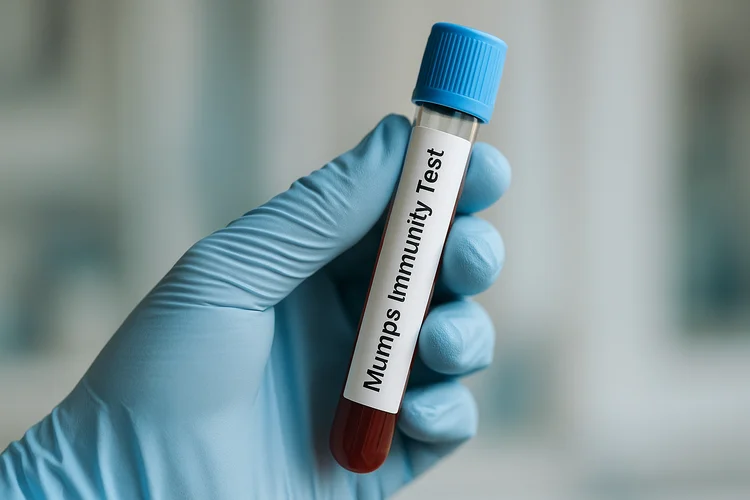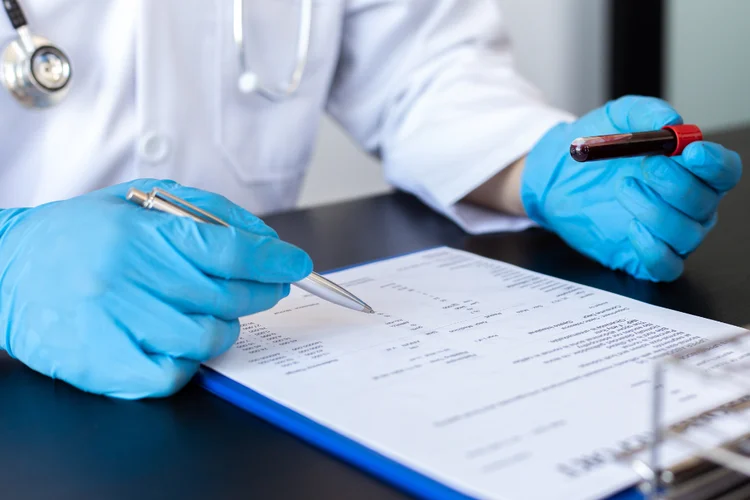Mumps Immunity Test
Last updated: Dec 20, 2025
What Is a Mumps Immunity Blood Test?
The mumps immunity blood test
identifies antibodies in your bloodstream to confirm whether you have built
up protection against the mumps virus through
previous infection or immunisation.
This screening is often advised for those with unclear vaccination records, healthcare
professionals, and individuals who face a higher likelihood of exposure in their workplace
or community environment.

How Does a Mumps Immunity Blood Test Work?
A mumps immunity blood test works by measuring specific mumps antibodies in your blood, usually immunoglobulin G (IgG), to determine whether you
have developed immunity.
IgG antibodies indicate past infection or successful vaccination and are associated with long-term
immunity. A positive IgG result generally suggests that you are considered immune and can help guide
decisions about whether vaccination is needed.
Who Should Consider a Mumps Immunity Blood Test?
You may need a mumps antibody test if you are unsure about your immunity status or if you belong to
a higher-risk group.
The test is commonly advised for:
- Unsure or lacking documentation of past MMR vaccination.
- Enrolling in universities or institutions that require proof of immunity.
- Working in healthcare, childcare, or other high-contact environments.
- Travelling to regions with known or recent mumps outbreaks.
- Living with or recently exposed to someone diagnosed with mumps.
- Pregnant and do not have documented immunity.
If you are unsure whether the test is appropriate for you, consult a doctor for personalised advice.
Interpreting Mumps Blood Test Results
Mumps IgG test results are interpreted by assessing the level of antibodies in your blood, with outcomes generally categorised as positive, negative, or equivocal.
- Positive IgG – Indicates immunity to mumps, typically due to past infection or successful vaccination.
- Negative IgG – Suggests a lack of detectable immunity; your doctor may recommend vaccination based on your risk profile.
- Equivocal Result – Means the result is inconclusive, and a repeat test may be required to confirm your immunity status.
Your doctor will interpret your result alongside your medical history, vaccination records, and current health circumstances.

Mumps Immunity Blood Test Cost
At ATA Medical, we offer mumps IgG immunity testing along with a range of related tests and vaccinations. Prices are as follows:
| Test / Vaccinations | Price* |
|---|---|
| Consultation | From $49.05 |
| Immunity Testing | |
| Mumps IgG Antibody | $144.97 |
| Measles IgG Antibody | $100.28 |
| Rubella IgG Antibody | $28.34 |
| Varicella-Zoster IgG Antibody | $49.05 |
| Hepatitis Bs Antigen & Antibody | $21.80 |
| Vaccinations | |
| Measles, Mumps, Rubella (MMR) Vaccine | From $0 per dose (depending on age and eligibility for CHAS, PG, or MG subsidies) |
| Varicella (Chickenpox) Vaccine | $103.55 per dose |
| Shingles Vaccine | $375 per dose |
| Hepatitis A & B Vaccine | From $54.50 per dose |
^Prices last updated on Jan 28, 2026. While every effort is made to keep pricing information up to date, please contact our team to confirm the latest rates.
How Long Does a Mumps Immunity Blood Test Take?
A mumps immunity blood test typically takes around 30 to 60 minutes at our clinic, including
consultation and sample collection during off-peak periods.
Results are generally available within 3 to 5 working days, depending on the laboratory’s processing
time. Your doctor will contact you to explain the results and recommend any next steps if needed.
How to Prepare for a Mumps Immunity Blood Test?
No special preparation is required for a mumps antibody test. You may eat and drink as usual before
your appointment, and fasting is not necessary.
If you are feeling unwell or taking medications that may affect your immune response, inform your
doctor in advance. They may advise whether it is appropriate to proceed with the test or postpone it
until a more suitable time.
Where Can You Get a Mumps Immunity Blood Test in Singapore?
ATA Medical @ Orchard
Nearest MRT: Orchard Boulevard Station (TE13)
Contact Number: 6223 0682
Email: camden@atamed.sg
Opening Hours:
Mon - Fri: 8:30 AM to 12:30 PM, 1:30 PM to 5:30 PM
Sat: 8:30 AM to 12:30 PM
Sun & PH: Closed
ATA Medical @ Tanjong Pagar
Nearest MRT: Tanjong Pagar Station (EW15)
Contact Number: 6223 0682
Email: hi@atamed.sg
Opening Hours:
Mon - Fri: 8:30 AM to 12:30 PM, 1:30 PM to 5:30 PM
Sat: 8:30 AM to 12:30 PM
Sun & PH: Closed
ATA Medical @ Jurong
Nearest MRT: Jurong East MRT Station (NS1/EW24)
Contact Number: 6348 6292
Email: jurong@atamed.sg
Opening Hours:
Mon - Fri: 8:30 AM to 12:30 PM, 1:30 PM to 5:30 PM
Sat: 8:30 AM to 12:30 PM
Sun & PH: Closed


